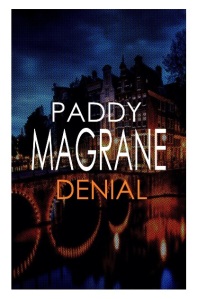Guest Post: Paddy Magrane
 Sam Keddie is back. The therapist hero of Paddy Magrane’s novel Disorder returns in its high-octane sequel, Denial, which is once again a startling blend of psychological and political thriller. In Denial, a riot breaks out at Creech Hill Immigration Detention Centre. Zahra Idris, a terrified Eritrean detainee suffering with amnesia, escapes.
Sam Keddie is back. The therapist hero of Paddy Magrane’s novel Disorder returns in its high-octane sequel, Denial, which is once again a startling blend of psychological and political thriller. In Denial, a riot breaks out at Creech Hill Immigration Detention Centre. Zahra Idris, a terrified Eritrean detainee suffering with amnesia, escapes.
That evening, Zahra’s psychotherapist, Sam Keddie, finds his girlfriend lying unconscious in their home – the victim of a brutal attack. When Zahra’s solicitor is found dead, drowned in the waters of the Regent’s Canal, Sam becomes convinced that his connection with Zahra is significant – and that someone wants them both dead.
He tracks down a frightened, confused Zahra in Amsterdam. But their pursuers are close behind, and Sam and Zahra are soon on the run. As they’re hunted through Europe, Sam races against time to piece together Zahra’s fragile memories and discover why she and those close to her are being picked off – one by one.
So it’s safe to say that psychological thrillers are a *thing,* these days. As readers, we’re as much interested in what goes on inside the heads of the characters as we are in the mechanics of the plot. And Paddy, an old friend of this blog, has got a head-start on most novelists in this respect: he’s a psychotherapist.
In this fascinating Guest Post, Paddy talks about how he puts this own therapeutic skills to use as a novelist and how digging deep into our troubled psyches can often produce dramatic gold…
When people twig that I’m a novelist and psychotherapist, they often assume that being a shrink guarantees a rich, steady source of material. I have to gently explain that what clients tell me in the counselling room is confidential. And even if I was the unscrupulous type to mine their inner lives, most of them are not involved in murder and big government cover-ups.
That said, my psychotherapeutic knowledge and skills come in very handy when writing. Take ‘unconditional positive regard’, for example. This is what Rogerian therapists call a core condition – one that ensures shrinks of his persuasion offer a non-judgmental stance, whatever a client talks about or presents with. It’s particularly useful when writing villains. It helps me focus on the whole human, rather than on a ‘bad’ trait. The point is, real-life baddies – unless they’re psychopathic – feel and suffer much like the rest of us. They’ve often just made terrible errors of judgment or spur-of-the-moment mistakes. These might be truly heinous acts, but not their sole defining characteristic. They’re sons, daughters, husbands, wives, brothers and sisters, not just panto villains.
The other area of knowledge that’s really valuable is psychoanalysis, particularly the work of the daddy of it all, Sigmund Freud. Freud was constantly by my side while I was writing Disorder. As we all know, he was interested in early childhood development, which he believed is crucial to the formation of adult personality. This was key to my understanding of Aidan Stirling - the Prime Minister’s son. And Freud’s Oedipal theory – which explores the idea that a man is unconsciously attracted to his mother while feeling hostility towards to his father (that’s the potted version, by the way) – was also pivotal. Aidan Stirling is, in effect, a Freudian construct, though it’s fair to say I pushed the envelope a little with the poor lad.
Freud was also interested in repression – how we humans compartmentalise pleasurable instincts, often because of shame or anxiety. Repression, he believed, could lead to self-destructive or even anti-social behaviour. This theory really helped me when I was writing the character of Harry Tapper in Denial, whose repressed desires are literally his downfall.
Stepping away from my own work, I’ve always loved reading writers who empathically understand what it’s like to suffer a mental illness or disintegration. On that note, I’d highly recommend Patrick McGrath. The author’s father was a superintendent at Broadmoor and McGrath grew up in the grounds of the prison. His novel, Asylum, is a chilling but masterful tale of an inmate who falls in love with the superintendent’s wife.
And then of course there’s Thomas Harris, who gave Hannibal Lecter such extraordinary depth. Lector is violent and incredibly dangerous, yet a man of refined tastes in art, cuisine and music. Harris offers his hero plenty of unconditional positive regard and seeks to understand the ghastly childhood experiences that have forced the shrink to absorb and normalise barbarism. Harris is an exquisite writer whose dark, complex villain comes alive through deep psychological insight. Those who, like me, write about psychological issues, toil in his formidable shadow.
***
Denial, by Paddy Magrane, is available in ebook from Fahrenheit Press.

